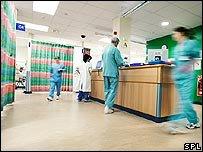NHS 'reorganisation' is outlined
- Published

An independent board will set NHS priorities
The NHS in England is to be reorganised with Strategic Health Authorities downgraded, the government has confirmed.
The 10 existing authorities plan health services and training for healthcare professionals.
The Lib Dem manifesto described them as the least effective part of the health service, and promised to abolish them.
The coalition government has now confirmed an independent board for the NHS which will set priorities.
A spokesman for the Department of Health said: "The board will combine functions currently provided by the Department of Health and Strategic Health Authorities, and deliver these in a much more streamlined way.
"So the remit of SHAs will change - the board will exercise its functions through the regional offices that will report directly to the chief executive."
Vital role
In the meantime, Strategic Health Authorities would continue to have a vital role in delivering financial control and performance, and driving improvements in quality and productivity, he said.
"They will play a key role in creating an NHS that is able to focus on outcomes and deliver through strong commissioning.
"The process of change will begin with SHAs themselves, where there will be a clearer split between their commissioner and provider responsibilities."
At a local level, groups of GPs will be asked to take on greater responsibility for organising care. The government is expected begin negotiations with the British Medical Association to allow that to happen.
The health service in England has been promised real-term increases in its budget every year of this parliament by the coalition.
It is thought the political price to be paid for that will be very significant cuts at the Department of Health in Whitehall.
Managers at the most senior level in the NHS have been told changes could happen within the next two years. Strategic Health Authorities, which plan staff numbers and services at a regional level, would become outposts of the new board.
Karen Jennings, head of health at Unison, said: "SHAs play a vital role in making sure that there are no shortfalls or gaps in healthcare provision across a region and nationally and in overseeing standards."
Local planning in the NHS, currently done by Primary Care Trusts would also change, if family doctors took over part of that work.
Primary Care Trusts were created by the Labour government, and in their relatively short history have already been reorganised. In 2006 the numbers of PCTs was halved to 152, a process which doctors criticised at the time for leading to a period of upheaval and indecisiveness.
Any major changes in the NHS in England will come at a time when it is grappling with trying to find ВЈ15bn to ВЈ20bn of savings by 2014.
The Conservatives and Liberal Democrats had previously said they would try to avoid major restructuring.